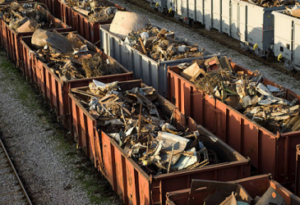
In 2023, enterprises engaged in operations with ferrous metal scrap may increase the volume of scrap metal procurement by 20-25% compared to the previous year – up to 1.2-1.25 million tons.
Such a draft balance of scrap metal formation and consumption in the country for 2023 was recommended for approval by the majority of votes of the members of the working group under the Ministry of Strategic Industries of Ukraine.
At the meeting of the working group chaired by the First Deputy Minister Oleg Mozhny considered the issue of approval of the balance of formation and consumption of scrap metal in Ukraine for 2023. The meeting was attended by industry associations: the Ukrainian Association of Secondary Metals (UAVtormet), UAVtormetresurs, the Association of Enterprises “Ukrmetallurgprom”, the Association of Foundrymen of Ukraine (ALU), as well as industry experts and scientists.
According to the draft balance sheet, Ukraine will smelt 5.2-5.6 million tons of steel in 2023 (6.263 million tons were produced in 2022), harvest 1.2-1.25 million tons of scrap metal (in 2022 – 997 thousand tons), metal enterprises will consume 5.2-5.6 million tons of steel (in 2022 – 997 thousand tons). steel companies will consume 0.950-1 million tons of scrap metal (896 thousand tons), export 180-200 thousand tons of scrap metal (53.6 thousand tons), increasing the export of raw materials strategic for metallurgists by 3.4-3.7 times compared to last year.
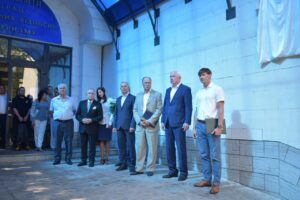
Higher education and the gastronomy industry have joined forces to create a new training center.
Academy of Labor, Social Relations and Tourism has announced the opening of a new Department of Gastronomy, Sommelier and Wine Culture, which is an important step in the development of gastronomy in Ukraine and will provide new opportunities for professional development for students and guests of the educational institution.

The grand opening of the department was attended by prominent figures from various fields, which symbolizes the broad support for the initiative. One of the invited guests was Ricardo Fernández Núñez, owner of Vinos de la Luz, an international wine group with wineries in Argentina, Spain, and Italy, as well as offices in Ukraine and Poland and production in the United States. He also holds a Doctorate, which recognizes his active role in the development of the wine industry. During his speech, Nunez expressed his deep support for Ukraine and his willingness to fight for its freedom and identity. He noted that he supports Ukraine not only with words, but also with his activities, trying to contribute to the country by means available to him.
Mykola Malomuzh, former Head of the Foreign Intelligence Service of Ukraine, also took part in the opening of the chair. His presence at the event demonstrates the government’s support and interest in the development of the gastronomy industry.
Hryhorii Osovyi, Chairman of the Federation of Trade Unions of Ukraine since 2014, emphasized the importance of vocational training in the gastronomy sector and its impact on the country’s social development.
In his turn, Viktor Sukhomlyn, Acting Rector of the Academy, PhD in Public Administration, Honored Worker of the Social Sphere of Ukraine, emphasized the importance of developing the new department and its contribution to the training of gastronomy and sommelier specialists. He noted that this initiative will contribute to improving the quality of education in Ukraine and developing wine culture among our citizens.
The Chairman of the Supervisory Board of the Academy, Yevhen Mykhailovych Drapyatyi, expressed his support for the new project, the implementation of which is an important step towards the development of the gastronomy industry for the further successful development of the country.
“The opening of the new department marks the beginning of a new stage of gastronomic education in Ukraine,” said Volodymyr Pechko, Chairman of the UKRSADVINPROM Public Union.
He also expressed his support for this innovative step and thanked the initiative’s participants for their work in restoring the international organization and bringing it back to Ukraine.

Natalia Blagopoluchna, President of the All-Ukrainian Association of Winemakers and Sommeliers, head of the first Ukrainian sommelier school “Master Class”, also spoke about the history of the first sommelier school in Ukraine, which was born more than twenty-three years ago. Since then, the school has been providing students and guests of the Academy of Labor with ample opportunities for training and development in the areas of tourism and social relations. Not only does it allow students to gain solid knowledge, but it also facilitates the acquisition of practical experience in the gastronomic field, which stimulates the further development of gastronomic culture in Ukraine.
Maksym Urakin, founder of the Club of Experts think tank, publisher, and marketing director of Interfax Ukraine, in turn, emphasized the importance of developing education in Ukraine and stressed that this initiative is a step towards training a new generation of professionals who will restore and develop the country in the future.
Thanks to the support and activity of prominent personalities and the university staff, the new Department of Gastronomy, Sommelier, and Wine Culture promises to become a leader in the field of gastronomic education and development of wine culture in Ukraine. We stay in touch to follow the further achievements and contribution of this department to the gastronomic heritage of our country.
The Academy of Labor and Social Relations was established in 1993 with the aim of providing high-quality program-targeted training of specialists in the field of law, market relations, social partnership, labor organization, and management. In 2013/2014, the name of the Academy was renamed to the Academy of Labor, Social Relations and Tourism. Along with the use of modern advanced teaching technologies, the Academy also draws on the many years of experience and traditions of the Higher School of Trade Union Movement.
Today, the Academy is a leading higher education institution in Ukraine, a national center of modern knowledge about society and social technologies.
ACADEMY OF LABOR, DEPARTMENT OF GASTRONOMY, DEPARTMENT OF SOMMELIER, EDUCATION, GASTRONOMY, HRYHORIY_OSOVYI, NATALIA_BLAGOPOLUCHNA, RICARDO_NUNEZ, VIKTOR_SUKHOMLYN, WINE, WINE CULTURE, WINEMAKING, YEVHEN_DRAPYATY, АПСВТ

On September 7, the National Bank of Ukraine (NBU) revoked the licenses of Gestalt Group Insurance Company and INTO Insurance Company (both based in Kyiv) to conduct financial services business.
According to the regulator’s website, the decision was made with respect to Gestalt Group due to the fact that the insurer’s ownership structure does not meet the requirements of Ukrainian legislation, and with respect to INTO for failure to comply with the National Bank’s decisions to eliminate violations of license conditions.
According to the latest financial statements submitted by Gestalt Group Insurance Company, as of June 30, 2023, the company’s insurance premiums amounted to UAH 5,971 million, assets amounted to UAH 81,642 million, and insurance reserves amounted to UAH 1,952 million. The company’s market share in terms of insurance premiums amounted to 0.03%.
According to the latest reports submitted by INTO Insurance Company, the volume of insurance premiums amounted to UAH 28.767 million, the value of assets – UAH 139.178 million, insurance reserves – UAH 18.028 million. The company’s market share in terms of insurance premiums amounted to -0.2%.
The NBU emphasizes that the decisions come into force on September 8. In the event of license revocation, a financial services representative must fulfill its obligations under contracts with clients for the type of financial services specified in the decision, concluded before the date of entry into force of the decision to revoke the license.
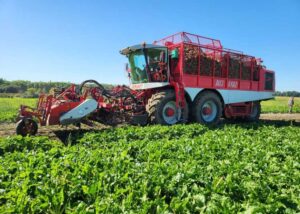
Astarta, the largest sugar producer in Ukraine, has started harvesting sugar beet, for which it has allocated 39 thousand hectares in the 2023 season, the group’s website reports.
According to the report, on September 8, farmers in Vinnytsia region started digging, and agricultural producers in Poltava region will join the harvesting campaign on September 14.
According to preliminary estimates of the agricultural holding’s experts, this year’s yield and quality of sugar beet will be higher and better than last year’s figures.
In preparing for this year’s harvesting campaign and taking into account the experience of previous seasons, Astarta’s team paid special attention to logistics.
“The company has invested in the construction of almost 90 km of field roads. Also, on Astarta’s initiative and in close cooperation with the Poltava Regional Military Administration and the Globyno community, the company is completing the repair of a 25 km section of the Manzhelia-Globyno public road,” the statement said.
To optimize the delivery of raw materials from the field to the warehouses, the agricultural holding has purchased 22 self-propelled loaders.
In addition, Astarta continues to actively implement digital AgriChain products, including the new AgriChainLogistics module to optimize the processes of collection, delivery, storage and processing of raw materials.
“Astarta is a vertically integrated agro-industrial holding company operating in eight regions of Ukraine. It includes six sugar factories, agricultural enterprises with a land bank of 220 thousand hectares and dairy farms with 22 thousand cattle, an oil extraction plant in Globyno (Poltava region), seven elevators and a biogas complex.
As reported, Astarta earned EUR65.16 million in net profit in 2022, down 46.8% compared to 2021. Last year, the holding’s EBITDA decreased by 23.2% to EUR154.77 million, while revenue increased by 3.8% to EUR510.07 million.
In the first quarter of 2023, the agricultural holding earned EUR16.13 million in net profit, up 6.2 times compared to the first quarter of 2022, its revenue increased by 37.1% to EUR163.55 million, and EBITDA by 63.5% to EUR37.91 million.
The major shareholders of Astarta at the end of the first half of the year were the family of its founder and CEO Viktor Ivanchyk – 40.11% and Fairfax Financial Holdings LTD with subsidiaries – 29.91%.
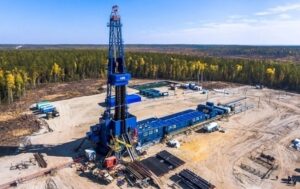
Due to the commissioning of new wells, JSC Ukrgasvydobuvannya (UGV) has increased its daily production of commercial natural gas by 3.31 million cubic meters since the beginning of 2023, according to a press release from Naftogaz Group on Friday.
“Thanks to the commissioning of 54 new gas wells since the beginning of the year and an increase in the number of service operations in August, the average daily production of natural gas by Ukrgasvydobuvannya reached its highest level since June 2020,” the company said.
According to Oleh Tolmachov, Acting CEO of UGV, the achieved increase in average daily production will allow the company to exceed the results of the previous two years by the end of the current year.
“In difficult conditions, the Ukrgasvydobuvannya team continues to work to provide the country with its own energy resources. I am grateful to my colleagues for their professionalism,” Tolmachev said in the press release.
As reported, UGV aims to increase natural gas production by 1 billion cubic meters in 2023 to 13.5 billion cubic meters. In 2022, UGV produced 12.5 billion cubic meters of natural gas (commercial), which is 3% less than in 2021.
NJSC Naftogaz of Ukraine owns 100% of Ukrgasvydobuvannya shares.
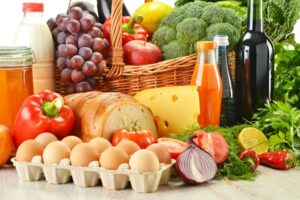
World food prices, which rose by 1.3% in July, returned to the previous trend in August, falling by 2.1% in monthly terms, according to a review by FAO (the Food and Agriculture Organization of the United Nations).
The index of world food prices in August amounted to 121.4 points, which is 2.1% lower than in July and 24% lower than the maximum level of March 2022. “Thus, the increase in the index observed in the previous month was leveled. The recorded decline is due to a drop in prices for dairy products, vegetable oils, meat and cereals amid a moderate increase in the sugar price index,” the document says.
The grain price index in August decreased by 0.7% compared to July and by 14.1% in annual terms. World wheat prices fell by 3.8%, largely due to increased supply from active seasonal crop supplies from several leading exporting countries in the Northern Hemisphere. Corn prices declined for the seventh consecutive month and reached their lowest level since September 2020.
Rice prices, on the other hand, increased by 9.8% compared to July and became the highest in the last 15 years. This is due to trade disruptions recorded after India imposed a ban on the export of Indian white rice in July.
The vegetable oil price index in August decreased by 3.1% compared to July after a short-term increase in July. This reflected a drop in global prices for palm, sunflower, soybean, and rapeseed oil. For example, global prices for sunflower oil fell by almost 8% due to weaker import demand amid high supply from major exporters.
The price index for dairy products fell by 4% last month. This is the eighth consecutive month of decline. Compared to August last year, it was 22.4%. In August, whole milk powder fell the most, due to significant supply, especially from Oceania, during the seasonal increase in production and under the influence of a decrease in imports by China.
Global skimmed milk powder prices reached their lowest level since mid-2020 due to sluggish import demand and weak market activity in Europe. Global prices for butter and cheese also fell due to similar factors.
The meat price index in August decreased by 3% compared to July and by 5.4% in annual terms. Lamb prices showed the largest decline, largely driven by a sharp rise in export supply, primarily from Australia, and weaker demand from China. The fall in pork prices was primarily due to low demand from major importing countries and strong export supply in Europe amid declining domestic sales. Poultry prices declined due to strong supply, especially from Brazil. Beef prices fell due to the high number of slaughter animals in a number of major producing countries and weak import demand.
In August, the sugar price index increased by 1.3% compared to July and by 34.1% in annual terms. This was mainly due to growing concerns about the El Niño weather phenomenon, which could lead to a decrease in expected global production.
The FAO Food Price Index is a weighted average indicator that tracks the dynamics of international prices for five major food commodity groups.